Greece v. Galloway
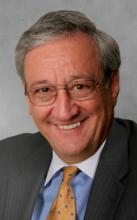
The great rejoicing after the U.S. Supreme Court’s recent ruling on public prayer reminded me of the infamous line from an officer who commented on the destruction of a village during the Vietnam War: “We had to destroy the village in order to save it!”
There isn’t much to celebrate in the high court’s decision in Greece v. Galloway to allow sectarian prayers to be spoken in all kinds of public meetings. The big loser in this judicial decision was prayer itself — its uniqueness and its authenticity.
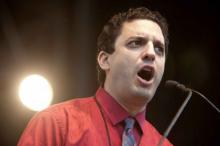
This week’s Supreme Court ruling allowing sectarian prayers at public meetings dealt a body blow to atheist organizations.
That was the assessment of David Silverman, president of American Atheists, speaking Tuesday to a group of nonbelievers at Stanford University. He then described a scenario that may raise eyebrows among some atheists: working with religious groups to fight against the ruling.
That’s a change for a man who has famously described religion as a “poison.” And it is emblematic, observers say, of the change that may result from the majority opinion in Greece v. Galloway, which found that prayers citing “the blood sacrifice of Jesus Christ” are permissible before government business.
Other secularists are likewise convinced that now is the time for atheists to join forces with members of minority faiths.
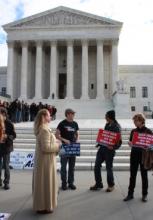
On Monday, the U.S. Supreme Court ruled that a city, town, or county could open its regular meetings with a sectarian (that is, Christian) prayer without violating the First Amendment’s Establishment Clause. Not unexpectedly, the much-anticipated Town of Greece v. Galloway decision split the court 5-4. It is, for that and other reasons, a less than satisfying decision.
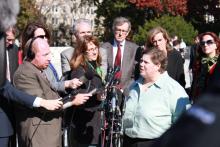
The Supreme Court Monday declared that the Constitution not only allows for prayer at government meetings, but religious prayer.
“To hold that invocations must be non-sectarian would force the legislatures sponsoring prayers and the courts deciding these cases to act as supervisors and censors of religious speech,” Kennedy wrote for himself and the conservatives on the court.
Lawmakers and judges would otherwise have to police prayer, he wrote, involving “government in religious matters to a far greater degree than is the case under the town’s current practice of neither editing nor approving prayers in advance nor criticizing their contact after the fact.”
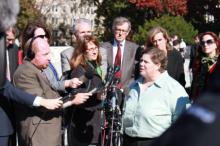
The U.S. Supreme Court will soon rule on the constitutionality of prayer at public meetings. But a new survey finds U.S. voters clearly favor prayer – as long the public prayer is generic and not specifically Christian.
A Jew and an atheist brought suit in Greece, N.Y., saying the Christian prayers excluded many citizens and violated the Constitution, which bans government establishment of religion. Even when the town began inviting non-Christians to give invocations, the “establishment” issue remained a question.
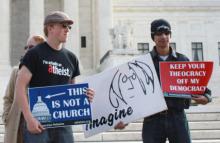
The Supreme Court struggled Wednesday with a case that asks whether government bodies can open with prayers that some people find overly religious and excluding.
From their lines of questioning, it’s unclear whether the court is ready to write new rules on what sort of prayer falls outside constitutional bounds. And more than one of the justices noted that just before they took their seats, a court officer declared: “God save the United States and this honorable court.”
Few court watchers believe the justices will rule all civic prayers unconstitutional — the nation has a long history of convening legislative bodies with such language.
Rather, the question raised by Town of Greece v. Galloway is how sectarian these prayers can get.